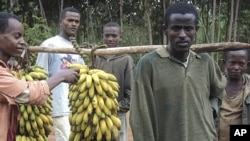A group of food experts and other officials from nine eastern and southern African countries opens a two-day meeting in Kenya's capital Wednesday to examine how to protect people's right to food in the region.
Among other things, the group will be looking at obstacles preventing people - especially the poor - from getting access to food.
Participant Odenda Lumumba, the coordinator of Kenya Land Alliance, says that up to 80 percent of Africa’s food producers are small-scale farmers, yet land-use policies in most African countries do not favor these famers, opting instead for larger-scale operations.
“You have to re-do the policies, the laws, the instruments of access to land to enable as many people as practically possible to be into the production of food," he said. "I think you cannot afford at any cost to have fewer people with larger farms purporting to produce food for the rest.”
Lumumba says the largest portion of land in Africa is outside the formal legal system. Small-scale farmers, who he says typically “suffer from insecure tenure,” are less likely to invest in the land or even to wait for the harvest if they do not have a title to that land.
He says access to water and the development of infrastructure such as roads are also huge problems facing small-scale farmers.
For participant Fatima Shabodien, director of the Women on Farms Project, South Africa, a big roadblock is that policies and frameworks often do not translate into action on the ground, especially for women.
“Women are central to the issue of food security in a number of ways, not the least because women are the primary producers of food in our region, but also women are responsible for managing food security at the household level," said Shabodien. "We also know, in the context of food insecurity or shortage, it is often women who forego food in favor of men and children, so we do think that any strategies that are discussed should place women at the center.”
Shabodien and Lumumba are two of some 45 food experts, policy-makers, politicians, human rights activists, and others meeting in Nairobi.
The meeting, chaired by the United Nations Special Rapporteur on the Right to Food, will discuss the concept of access to food as being a human right, and look at approaches that different countries are taking to ensure that everyone - especially the poor - has food.
For instance, the South African and Kenya constitutions contain a provision that states that everyone has the right to have access to adequate food.
The particpants hope to develop a network of officials - especially parliamentarians - that would work on strengthening laws and constitutions in their countries to increase food security.
The U.N. rapporteur will also present a report on food security to the U.N. General Assembly and U.N. agencies.
According to the U.N., more than one billion people globally are undernourished, while more than two billion people suffer from a lack of essential vitamins and minerals in their food. Almost six million children die every year from malnutrition or related diseases.
The right to food is recognized in the 1948 Universal Declaration of Human Rights.
News
'Right to Food' Focus of Nairobi Conference




